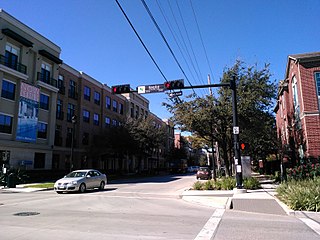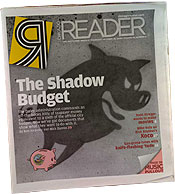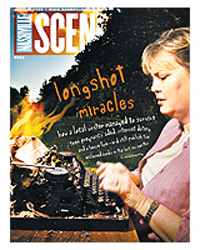Dallas Observer is a free digital and print publication based in Dallas, Texas. The Observer publishes daily online coverage of local news, restaurants, music, and arts, as well as longform narrative journalism. A weekly print issue circulates every Thursday. The Observer has been owned by Voice Media Group since January 2013.

The Riverfront Times (RFT) is a free progressive weekly newspaper in St. Louis, in the U.S. state of Missouri, that consists of local politics, music, arts, and dining news in the print edition, and daily updates to blogs and photo galleries on its website. As of June 2008, the Riverfront Times has an ABC-audited weekly circulation of 81,276 copies.

Midtown is a central neighborhood of Houston, located west-southwest of Downtown. Separated from Downtown by an elevated section of Interstate 45, Midtown is characterized by a continuation of Downtown's square grid street plan, anchored by Main Street and the METRORail Red Line. Midtown is bordered by Neartown (Montrose) to the west, the Museum District to the south, and Interstate 69 to the east. Midtown's 325 blocks cover 1.24 square miles (3.2 km2) and contained an estimated population of nearly 8,600 in 2015.

Salt Lake City Weekly is a free alternative weekly tabloid-paged newspaper published in Salt Lake City, Utah. It began as Private Eye. City Weekly is published and dated for every Thursday by Copperfield Publishing Inc. of which John Saltas is majority owner and president.

The Chicago Reader, or Reader, is an American alternative weekly newspaper in Chicago, Illinois, noted for its literary style of journalism and coverage of the arts, particularly film and theater. It was founded by a group of friends from Carleton College.

LA Weekly is a free weekly alternative newspaper in Los Angeles, California. The paper covers Los Angeles music, arts, film, theater, culture, concerts, and events. LA Weekly was founded in 1978 by Jay Levin, who served as its editor from 1978 to 1991 and its president from 1978 to 1992.

The Detroit Metro Times is a progressive alternative weekly located in Detroit, Michigan. It is the largest circulating weekly newspaper in the metro Detroit area.
An alternative newspaper is a type of newspaper that eschews comprehensive coverage of general news in favor of stylized reporting, opinionated reviews and columns, investigations into edgy topics and magazine-style feature stories highlighting local people and culture. Its news coverage is more locally focused, and their target audiences are younger than those of daily newspapers. Typically, alternative newspapers are published in tabloid format and printed on newsprint. Other names for such publications include alternative weekly, alternative newsweekly, and alt weekly, as the majority circulate on a weekly schedule.
Philadelphia City Paper was an alternative weekly newspaper in Philadelphia, Pennsylvania. The independently owned paper was free and published every Thursday in print and daily online at citypaper.net. Staff reporters focused on labor issues, politics, education and poverty. Critics reviewed the city's arts, entertainment, literary and restaurant scene. Listings of concerts, art exhibits, dance performances and other events were carried in the paper and in a comprehensive online events calendar.
SF Weekly is an online music publication and formerly alternative weekly newspaper founded in the 1970s in San Francisco, California. It was distributed every Thursday, and was published by the San Francisco Print Media Company. The paper has won national journalism awards, and sponsored the SF Weekly Music Awards.

The Cleveland Scene is an alternative weekly newspaper based in Cleveland, Ohio. The newspaper includes highlights of Cleveland-area arts, music, dining, and films, as well as classified advertising. The first edition of the newspaper was published in the 1970s.
Village Voice Media or VVM is a newspaper company. It began in 1970 as a weekly alternative newspaper in Phoenix, Arizona. The company, founded by Michael Lacey (editor) and Jim Larkin (publisher), was then known as New Times Inc. (NTI) and the publication was named New Times. The company was later renamed New Times Media.

Nashville Scene is an alternative newsweekly in Nashville, Tennessee. It was founded in 1989, became a part of Village Voice Media in 1999, and later joined the ranks of sixteen other publications after a merger of Village Voice Media with New Times Media early in 2006. The paper was acquired by SouthComm Communications in 2009. Since May 2018, it has been owned by the Freeman Webb Company. The publication mainly reports and opines on music, arts, entertainment, and local and state politics in Nashville.

Orlando Weekly is a liberal progressive alternative newsweekly distributed in the Greater Orlando area of Florida. Every Thursday, 40,000 issues of the paper are distributed to more than 1,100 locations across Orange, Osceola and Seminole counties.

The Santa Fe Reporter (SFR) is an alternative weekly newspaper published in Santa Fe, New Mexico. First published in 1974, the Santa Fe Reporter features reports on local news, politics, art and culture, and is published once a week on Wednesdays. In 1988, the newspaper was acquired by Hope Aldrich Rockefeller. Since 1997, the Reporter has been owned and published by Portland, Oregon-based City of Roses Newspaper Company, which also publishes Willamette Week and Indy Week. Since September 2016, the paper's publisher & editor has been Julie Ann Grimm, with Anna Maggiore serving as associate publisher & advertising director. Julie Ann Grimm had previously been editor of the paper since August 2013. Alex De Vore has been covering music, arts and culture for the Reporter since 2008, and became culture editor in 2016. The Reporter celebrated its 40th anniversary in June 2014.

Space City! was an underground newspaper published in Houston, Texas from June 5, 1969 to August 3, 1972. The founders were Students for a Democratic Society veterans and former members of the staff of the Austin, Texas, underground newspaper, The Rag, one of the earliest and most influential of the Sixties underground papers. The original editorial collective was composed of Thorne Dreyer, who had been the founding "funnel" of The Rag in 1966; Victoria Smith, a former reporter for the St. Paul Dispatch; community organizers Cam Duncan and Sue Mithun Duncan; and radical journalists Dennis Fitzgerald and Judy Gitlin Fitzgerald.

The Monterey County Weekly is a locally owned and independent newsmedia company founded in 1988. As per the publication's name, it publishes in print weekly, and since 2020 online daily as Monterey County NOW. The company is based in the city of Seaside, in Monterey County, California. The Weekly has been a member of the Association of Alternative Newsmedia since 1989.
Voice Media Group (VMG) is an American privately held media company headquartered in Denver, Colorado. VMG owns several newspaper publications across the country. These offerings extend across print, mobile and digital marketing.

Public News, Inc. (PN) was an alternative newsweekly in Houston, Texas established in February 1982. The paper ceased publication in July 1998, with its advertising base and paid circulation acquired by the Houston Press, part of the New Times Media alternative newspaper chain. It was headquartered at 2038 Lexington in Houston. For most of its history, the owner was Bert Woodall. In 1997 the circulation was 47,000. It was published each Wednesday, and distributed for free. It had a focus on the arts, including music. The paper ranged in size from 12 to 56 pages, but most editions ran to 36 pages. It had a cooperation agreement with the Alternative Weekly Network (AWN), but was not a member of the New Times-dominated Association of Alternative Newsmedia (AAN).














